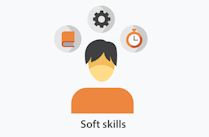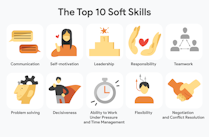20 Soft Skills Employers Look For in 2026 (With Examples)
All products and services featured are independently selected by WikiJob. When you register or purchase through links on this page, we may earn a commission.
- What Are Soft Skills?
- Why Are Soft Skills Important?
empty
empty
empty
empty
empty
- Top 20 Soft Skills List in the Workplace in 2026
empty
empty
empty
empty
empty
empty
empty
empty
empty
empty
empty
empty
empty
empty
empty
empty
empty
empty
empty
empty
- Soft Skills vs Hard Skills
- Frequently Asked Questions
- Final Thoughts
Beyond your work experience and qualifications, the factors that decide your suitability as a job candidate can often be found in the soft skills that you possess.
Therefore candidates with certain key soft skills are in high demand by employers and hiring managers.
Soft skills are the more intangible and non-technical abilities that are sought from candidates, for example:
- Communication
- Teamwork
- Problem-solving
- Leadership
- Responsibility
Soft skills are sometimes referred to as transferable, interpersonal or meta skills. These skills are less specialised, less rooted in specific vocations, and more aligned with the individual attributes and personality of a candidate.
Soft skills relate to your attitudes and your intuitions. As soft skills are less about your qualifications and more personality-driven, it is important to consider what your soft skills are and how you might show evidence of them before you apply for a job.
This is particularly true of the recruitment process for graduate programmes, where transferable skills and potential often take precedence over professional experience.
Consideration of your soft skills may also assist your job search by identifying which vacancies are suitable for you.
What Are Soft Skills?
Soft skills refer to a set of personal attributes that enable individuals to interact effectively with others and perform their job responsibilities well.
These skills are typically associated with an individual's emotional intelligence and include traits such as communication, teamwork, leadership, time management, problem-solving, adaptability and empathy.
Unlike hard skills, which are specific technical or job-related abilities, soft skills are transferable across a variety of industries and job roles and can be developed and improved over time through practice and experience.
Soft skills are highly valued in the workplace, as they contribute to a positive work culture and can lead to increased productivity, improved teamwork and better overall job satisfaction.
Employers often seek candidates with strong soft skills in addition to technical skills when making hiring decisions.
Why Are Soft Skills Important?
Soft skills are crucially important for individuals to succeed in the workplace and in their personal lives.
The benefits of soft skills include:
Enhanced Communication
Soft skills like listening, speaking and writing are critical to effective communication in the workplace.
Communication is essential for building relationships, managing conflicts and achieving shared goals.
Better Collaboration
Soft skills such as teamwork, leadership and empathy can help individuals work more effectively with others.
By understanding others' perspectives, individuals can work together to achieve a common goal.
Improved Productivity
Time management, problem-solving and adaptability are essential soft skills that can help individuals work more efficiently and effectively.
By managing time well and finding solutions to problems, individuals can complete tasks quickly and with high quality.
Career Advancement
Developing soft skills can help individuals advance their careers. Employers often value soft skills in addition to technical skills when making hiring and promotion decisions.
Positive Work Culture
Soft skills contribute to a positive work culture by promoting teamwork, collaboration and empathy.
This can lead to increased job satisfaction and a more productive work environment.
Developing soft skills is important because it enables individuals to interact effectively with others and perform their job responsibilities well.
While hard skills are specific to a particular job or industry, soft skills are transferable and applicable across different settings.
Individuals can develop soft skills through training, practice and feedback. By developing soft skills, individuals can improve their communication, collaboration, productivity and career prospects, while contributing to a positive work culture.

Top 20 Soft Skills List in the Workplace in 2026
This section is an extensive, but not exhaustive, guide to the key soft skills sought by employers in 2026.
It is important to check the job description for the job you are applying for as the required soft skills will vary considerably depending on the sector/type of role.
You should always aim to highlight the most appropriate types of skills for the role to ensure you appear to be the best candidate.
Here are some soft skills examples:
1. Communication
Effective communication is one of the most important soft skills. Able communicators can adjust their tone and style according to their audience, comprehend and act efficiently on instructions, and explain complex issues to co-workers and clients alike.
A key but often forgotten communication skill is listening. Active listening is a valuable soft skill to develop.
It involves considering what may be communicated to you before you listen, giving the speaker your full attention without interruption, understanding what you have been told, choosing the key relevant points and reflecting on that information.
Whether you are dealing with a customer complaint or working with your colleagues, good listening skills will help you learn and respond correctly to the circumstance you have been presented with.
Equally as important are your verbal communication and non-verbal communication skills.
Verbal social skills are key to fostering relationships that are collaborative, respectful, and ultimately, productive. This also applies to your written communication skills.
Much business communication is now played out by email, so it is important to have good email etiquette and give instructions clearly and concisely.
2. Self-Motivation
Having a positive attitude and the initiative to work well without around-the-clock supervision is a vital soft skill for any employee.
Not only does it demonstrate reliability and commitment, but it also shows that you can effectively fit into an organisational structure without the need for constant supervision.
To demonstrate your self-motivation, think about these key skills:
- Positivity
- Ambition
- Commitment
- Initiative
3. Leadership
Leadership is a soft skill that you can demonstrate even if you are not directly managing others.
Those with strong leadership skills have the ability to inspire and lead teams to success. This is why leadership is such a sought-after skill.
People with well-developed leadership skills demonstrate a range of traits that are useful in the workplace, including:
- A positive attitude and outlook
- The ability to make quick and effective decisions
- Exemplary problem-solving or conflict management skills
- The ability to communicate effectively
- An aptitude for both self-motivation and the motivation of others
Even if you apply for an entry-level role, you should not be afraid to demonstrate your potential by showing how you have positively influenced others to take a project to success.
4. Responsibility
Responsibility is a seldom talked about but highly valued soft skill. Colleagues who fail to take responsibility for their work will be less productive and accordingly less successful overall.
To demonstrate a high level of responsibility, make sure you master these skills:
- Trustworthiness
- Discipline
- Motivation
- Conscientiousness
- Accountability
- Resilience
- Adaptability
Taking responsibility means taking ownership of not only your goals but the wider company goals. This will mean taking the initiative to make improvements, accepting responsibility for any failures and genuinely caring about working your way to success.
5. Teamwork
Good teamwork skills involve a combination of other soft skills.
Working in a team towards a common goal requires the intuition and interpersonal acumen to know when to be a leader and when to be a listener.
Good team players are perceptive, as well as receptive to the needs and responsibilities of others. Their people skills are highly developed.
6. Problem-Solving
Problem-solving does not just require analytical, creative and critical skills, but a particular mindset; those who can approach a problem with a cool and level head will often reach a solution more efficiently than those who cannot.
This is a soft skill which often relies on strong teamwork.
Problems need not always be solved alone. The ability to know who can help you reach a solution, and how they can do it, can be of great advantage.
7. Decisiveness
Decisiveness is characterised by quick and effective decision making. It does not mean recklessness or impulsiveness. Decisiveness requires the ability to:
- Put things into perspective
- Weigh up the options
- Assess all relevant information
- Anticipate any consequences, good or bad
A decisive employee will take effective and considered action quickly, especially when under pressure. They take responsibility for the consequences of their decision and adapt when mistakes are made.
This ensures that opportunities are not missed by lengthy analysis or debate.
8. Ability to Work Under Pressure
Many jobs come with demanding deadlines and high stakes. Hiring managers prize candidates who show a decisive attitude, an unfaltering ability to think clearly, and a capacity to compartmentalize and set stress aside.
The ability to work under pressure requires:
- Adaptability
- Emotional self-control
- Self awareness
In potentially hazardous roles, such as air traffic controller, police officer or healthcare professional, the ability to work under pressure is paramount.
9. Flexibility
Flexibility is an important soft skill because it demonstrates both an ability and a willingness to embrace new tasks and challenges calmly and without fuss.
Flexible employees are willing to help where needed and take on extra responsibilities. They can also adapt quickly when plans change.
Employers are interested in candidates who have a willing and upbeat attitude and can cope well with change.

10. Negotiation and Conflict Resolution
This is a key soft skill that employers look for in potential leaders.
To be an adept negotiator is to know how to be persuasive and exert influence, while sensitively seeking a solution which will benefit all parties.
Similarly, conflict resolution depends on strong interpersonal skills and the ability to establish a rapport with colleagues and clients alike.
11. Critical Thinking
Critical thinking is the ability to assess a situation or problem in a neutral manner.
This means removing:
- Personal bias
- Cultural assumptions
- The traditional approach (what has happened in the past)
- Thoughts of what you want the outcome to be
- Expectations of what you think the outcome will be
Critical thinking involves a process that includes:
- Asking questions
- Evaluating evidence
- Defining the problem
- Considering alternative solutions
- Self awareness
12. People Skills
'People skills' is another term for interpersonal skills or social skills. This soft skill covers a range of abilities and traits that are involved in how we interact with others, for instance, communication, assertiveness and openness.
Someone with good people skills knows how to approach others in a way that suits that particular person, is able to identify the dynamic of a team or group and fit in effectively, and has the self awareness to identify their own responses to others.
13. Strong Work Ethic
Employers highly value employees with a strong work ethic because these individuals are reliable, conscientious and productive.
A strong work ethic means that you are enthusiastic about your work, open to taking on more tasks and responsibilities, and committed to the success of the company that employs you.
14. Resilience
In a work context, resilience can mean a number of things:
- The ability to handle stress and avoid burnout
- Adapting to a changing environment, expectations and plans
- Handling disappointments at work; for instance, losing a long term client
From an employer’s perspective, resilient employees are reliable, exhibit higher levels of engagement and their greater levels of self awareness reduce the chance of burnout.
15. Dependability
A dependable employee can be relied on to do their best, to do what they say they will do and to be consistent in their behaviour.
Employers value dependable employees because they do not require ongoing supervision, and their behaviour, therefore their productivity, is generally predictable.
Dependability, as a soft skill, is as highly valued in a team position as in a leadership role.
16. Project Management
Generally, project management suggests an element of leadership. It involves leading a team to successfully complete a project, understanding both the bigger goals and the small steps that need to be completed along the way.
However, understanding the basics of project management can be just as effective for a team member
Project management skills can include a number of other skills on this list:
- Problem solving
- Critical thinking
- Technical skills (using certain software)
- Risk management
- Time management
- Deligation/Negotiation
- Communication
- Team building
Even if you do not hold a project manager or other leadership role, there may be opportunities to manage short-term projects at work.
17. Organizational Skills
Being well organised involves a number of organisational skills including:
- Time management
- Prioritizing your workload
- Working effectively
Employers value well-organized employees because they are seen as reliable workers who require little supervision.
18. Creativity
Creativity in the workplace is a soft skill that goes beyond the creative industries and roles. Instead, creativity or creative thinking is the method of approaching a topic or problem in new ways that are unblinkered by tradition to reach fresh solutions and innovation.
For instance, it is this creativity in work practices that has driven the move to advertise job vacancies on social media platforms like LinkedIn.
Creativity involves asking new questions, rejecting or temporarily benching generally held assumptions, and combining resources in a previously untried way.
19. Ability to Handle Criticism
The ability to handle criticism involves being open to feedback, actively listening and understanding how that criticism may improve your future performance.
Whether it is feedback in your yearly review or constructive comments on the progress of a project, the ability to handle criticism is a much needed soft skill to possess.
From an employer’s perspective, a worker who is not open to criticism is unlikely to progress further with the company or be able to improve their performance.
20. Time Management
Time management is closely related to the ability to work under pressure and to a deadline.
It involves being able to assess your workload, having an awareness of your own limitations and possessing the capacity to adapt to changing conditions.
Employees who manage their time well can efficiently prioritize tasks and organize their diaries while adopting an attitude which allows them to take on new tasks and deadlines.
Soft Skills vs Hard Skills
It is important to distinguish between hard and soft skills, both of which are valuable and required by employers across all industries and working environments.
While soft skills are more to do with your personality and non-technical abilities, hard skills can be taught through formal education or training.
These hard and soft skills might be developed through university or college attendance, online courses, on-the-job training, or other classes and training environments.
Hard skills, often referred to as technical skills, encompass the specific knowledge, abilities and expertise required to conduct a particular job successfully.
Soft and hard skills example:
- A programming role requires the technical skill of being able to code in a specific or varied coding language
- An accounting position requires strong accounting skills
- A doctor needs to be able to accurately diagnose medical conditions
- A graphic design position may require knowledge of specific design software
- An electrician needs to know how to install electrical systems safely and effectively
Hard skills are generally straightforward to evaluate or measure. For instance, employers may ask for a demonstration of a particular skill or to see formal certifications proving that a skill has been obtained. Alternatively, they may examine a candidate's work history and experience.
In contrast, soft skills are not formally taught within a class or course. They require a certain degree of emotional intelligence but can be developed or improved through observation of others, self-reflection and proactive personal development.
Frequently Asked Questions
The top five most important and sought after soft skills that employers are looking for are communication, leadership, teamwork, flexibility and problem-solving.
Employers are aware that the ideal candidate is more than a combination of qualifications and work experience.
Soft skills can make the difference between a candidate who has the perfect experience for a project management role but no people skills and an individual who may be less experienced as a manager but has the potential to inspire and get the best from their team.
Soft skills, in combination with qualifications and work experience, complete the whole picture of a candidate’s potential.
Employers look for a candidate who is the best fit for the job and the company now, and who has the potential to develop and stay with the company in the future.
Examples of soft skills are communication, teamwork, being able to handle criticism, time management and people skills.
Soft skills can make the difference between an adequate candidate and an ideal candidate. Where your fellow applicants have similar work experience and qualifications, the right soft skills can land you on the ‘yes’ pile ahead of them.
Having well developed soft skills, which are generally regarded as personality traits, suggests that you are a self aware individual who has spent time working on your abilities.
Spend time considering what your soft skills are. It may help to ask people who know you well.
Discover which of your soft skills are relevant for the job that you are applying for. Highlight your soft skills in your resume/CV and cover letter.
Mention them at your job interview too by providing examples of how you have used your soft skills. The STAR method is ideal for answering interview questions.
Increasing or improving your soft skills is an act of self development. It requires self-reflection, observation of others, and plenty of practice. You may find online personality tests helpful or self development training courses.
Final Thoughts
Increasingly, employers recognise that the ideal workforce is more than a list of qualifications and work experience. They are individuals with varying personalities and traits.
Soft skills fill in the gaps between the jobs you have held and the courses you have passed to present the whole you. It is this complete picture that more readily demonstrates your suitability for the job and potential as an employee.







